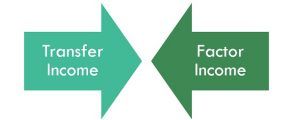 Disguised Unemployment refers to a form of unemployment that cannot be seen or noticed from outside, as it remains hidden. Basically, in disguised unemployment, it looks like everyone is employed however, ample full-time work is not available for all. On the contrary, Seasonal Unemployment is that type of unemployment in which people are not able to find any work for themselves during certain months of the year.
Disguised Unemployment refers to a form of unemployment that cannot be seen or noticed from outside, as it remains hidden. Basically, in disguised unemployment, it looks like everyone is employed however, ample full-time work is not available for all. On the contrary, Seasonal Unemployment is that type of unemployment in which people are not able to find any work for themselves during certain months of the year.
What is Unemployment?
Unemployment can be defined as a state of being without paid work, for an individual who is able (physically and mentally fit) and willing (ready) to work at the existing wage rate but may not find any job or activity which can help them in providing the basic means of living. Basically, it is a situation of automatic worklessness or idleness.
An unemployed person is someone, who is a part of the labour force and looking for work but is not able to find one.
Unemployment is broadly classified into two categories, i.e. Rural Unemployment and Urban Unemployment. There are three types of rural unemployment – open unemployment, seasonal unemployment and disguised unemployment. On the other hand, urban unemployment is of three types – industrial unemployment, educated unemployment and technological unemployment.
In this post, we have explained the difference between disguised unemployment and seasonal unemployment.
Content: Disguised Unemployment Vs Seasonal Unemployment
Comparison Chart
| Basis for Comparison | Disguised Unemployment | Seasonal Unemployment |
|---|---|---|
| Meaning | Disguised Unemployment implies a situation wherein individuals work for the entire day but do not make any contribution to the total output. | Seasonal Unemployment refers to the unemployment arising due to the seasonal changes in demand or production conditions. |
| Occurs when | A part of labor is supernumerary | The demand for labor is less in comparison to the usual demand. |
| In which industry it is found? | Agriculture | Agro-based Industry |
| Value Addition | Adds no value to the production. | Adds value to the production whenever possible. |
Definition of Disguised Unemployment
Disguised Unemployment is an unacknowledged form of unemployment wherein the activities of the individual indicate that they are busy or occupied in work be it related to agriculture or business, with their family members. Although, production reported by this occupation is almost negligible.
- Disguised unemployment is when the individual is not working up to his/her full capacity.
- It is mainly seen in agriculture and the unorganized sector.
- Individuals are not considered unemployed in the formal labour market statistics.
- This kind of unemployment is very severe and visible in rural areas.
In other words, disguised unemployment is a situation wherein the marginal productivity or contribution to the total output is almost nil. And so, even if some workers are withdrawn there won’t be any change in the total production. And due to this very reason, they are regarded as disguisedly unemployed.
Therefore it is quite obvious that such employment won’t add anything to the economy of people. It implies excess labour with zero productivity.
Also Read: Difference Between Absolute and Relative Poverty
Definition of Seasonal Unemployment
Such a situation wherein people engaged in seasonal activities, do not get any work, even when they are able and willing to work at the prevailing wage rate is called seasonal unemployment. It is also termed as periodic unemployment, because it arises at different points over the year, due to the seasonal nature of work.
There are a number of industries that report a sudden increase in activities during a particular season or period and so there is a requirement for a large labour force to handle the rush of work. But on other days the work is normal and during that time, a group of labour force remain unemployed. This generally happens with the dockworkers, construction workers working in sugar, woollen and ice factories. It is also related to agriculture.
Therefore, during the off-season, the workers remain idle and don’t have any work to do and so they wait for the next season to come, and search for the same work to get employed and earn money for their livelihood. Due to this situation, the labourers have to migrate from one place to another, to find work for themselves during the off-season.
Causes of Seasonal Unemployment
- Structural Forces: It includes factors like:
- Immobility of labour between occupations
- Shortage of Savings
- Lack of an investment climate
- Seasonal Variation: Fluctuations in demand of labour, due to engagement of a large number of workers in a specific occupation, at the time of peak demand, then the period of slack demand.
Also Read: Difference Between Laid Off and Fired
Key Differences Disguised Unemployment and Seasonal Unemployment
After we have discussed the meaning of the two forms of unemployment, now we are going to understand the difference between disguised unemployment and seasonal unemployment:
- Disguised Unemployment is a state in which the total number of workers carrying out the work or job is significantly higher than the number of workers actually needed to perform it. On the contrary, Seasonal Unemployment is a situation when there is a lack of productive work, during a specific period of the year.
- Disguised Unemployment occurs when a certain portion of workers are redundant. Conversely, in the case of seasonal unemployment the demand for labour, decreases than the normal demand during peak months.
- Disguised Unemployment can be majorly seen in agriculture, where if only two persons are required for the cultivation of the farm, then also five persons are employed. On the other hand, Seasonal unemployment can be primarily seen in agro-based industries, wherein during peak seasons large workforce is required, and in lean months, there is no such requirement of a huge workforce. So, employment is available in specific seasons or duration only.
- While seasonal unemployment adds value to production whenever possible in the sense that during the months of requirement value addition is done, in case of disguised unemployment adds no value to the production, i.e. even if some of the workers are withdrawn, the productivity level will remain the same.
Example of Disguised Unemployment
Out of 20 people working in agricultural land, even when the 8 people migrate to another city, the productivity of land remains the same. This implies that the contribution made by 8 persons to productivity is equal to zero.
Example of Seasonal Unemployment
Agriculture is primarily dependent on weather conditions, i.e. at a specific period of the year such as at the time of sowing seeds, threshing and harvesting crops, there is a heavy workload. But, once the work is completed the workers stay idle.
Conclusion
Unemployment results in the wastage of human resources of the country, due to which the assets become a liability for the economy, as it increases the economic overload. Disguised unemployment is the one that is not visible, and arises when the individual does not contribute anything to the total output. Conversely, Seasonal unemployment is the one that takes place at a particular time of the year.






Leave a Reply